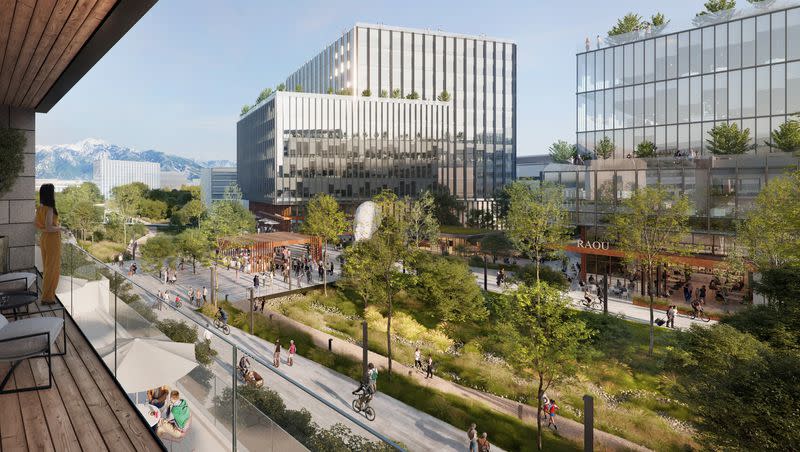A lot of Utah hotel rooms are already booked for a 2034 Olympics — here’s why

More than 21,000 Utah hotel rooms are already booked for a 2034 Winter Games, including some that have yet to be built.
Even though the International Olympic Committee won’t make the final decision on a site for 2034 until July, the Salt Lake City-Utah Committee for the Games has been signing contracts with hotel properties along the Wasatch Front and beyond.
Securing nearly 24,000 rooms for Olympic officials, media, sponsors and others during the Games is on the long list of detailed preparations that Salt Lake City must put together as the IOC’s “preferred host” for 2034.
Related
“It’s not a splashy part of the program, but it is a fundamental requirement to host the Games, making sure they have a place to sleep,” said John Sindelar, accommodations adviser to the bid committee.
Rooms are lined up as far away as Evanston, Wyoming; Logan; Tooele; and Nephi, he said.
One of the biggest locations for Games-time lodging will be The Point, the massive mixed-use development planned at the site of the former Utah State Prison. There, 1,000 rooms will be set aside in hotels and apartments, Sindelar said.
While the first phase of development at The Point could take as long as 15 years, construction on more than 3,300 housing units is expected to be underway as soon as next year, according to the Point of the Mountain State Land Authority.
Other entities that have committed at least 1,000 rooms during an Olympics include the Grand America and Little America hotels in Salt Lake City, and hospitality management companies that operate Hilton, Marriott and other nationally branded hotel properties.
Fewer than 2,000 of the rooms under contract haven’t been built, Sindelar said. Besides The Point, the others still on the drawing board are at the Ameyalli Wellness Resort in Midway, Black Rock Mountain Resort near Heber City, along with a couple of smaller chain hotels.
“We’ve been trying to keep track of what’s coming and trying to get them on board,” he said, noting the bid committee made deals with some of downtown Salt Lake City’s newest hotels, the Hyatt Regency, Le Meridien and Element, before they opened.
Related
Utah ended the year poised to host the 2034 Winter Games. Here’s how the IOC sees another Olympics
‘We will be ready’ to host 2030 Winter Games, French official tells Utah’s Olympic bidders
Sindelar, who has worked to secure lodging for a number of major sporting events since serving as director of accommodations for Salt Lake City’s last Olympics in 2002, said it’s not unusual for bids to propose that “thousands and thousands” of new rooms will be built.
“Our reliance on planned rooms is minimal in the grand scheme of things,” he said of Salt Lake City’s bid. “We’re not relying on rooms that don’t exist to make it possible to host the Games.”
The hotels and other properties that contract with the bid committee are not agreeing to a set rate for their rooms, Sindelar said, but to a formula based on yet to be determined base rate plus inflation and a premium based on how many rooms are committed.
There’s a community incentive, not just a financial one, for them to contract with the bid committee, he said. “I admire the hoteliers that have stepped up. We couldn’t do it without them.”
While some hotels may be counting on setting their own premium rates during an Olympics, Sindelar said the 180 properties that have contracted with the bid committee did so because they “want to see the Games come. And they’ll make good money.”
The holdouts may have “ambitious expectations” and may be taking a significant risk, Sindelar said, since there will be lodging available through home stays arranged through companies like Airbnb, now an international-level Olympic sponsor.
In 2002, he said Utah’s Olympic organizers put together a “homemade” residential accommodations program for matching Gamesgoers with locals looking to rent out their homes. Then, a modest four-bedroom house was expected to bring in up to $800 a night.
Fraser Bullock, the bid committee’s president and CEO, said the state’s hotel infrastructure has “dramatically increased” since the 2002 Winter Games, with “exciting things to come” like The Point development.
“We have been very encouraged by the active engagement of the Utah lodging community in support the Games,” Bullock said, crediting Sindelar’s experience and longstanding relationship with Utah’s lodging community with putting “us in a very good position.”
Utah has been bidding to host another Winter Games for more than a decade. Last November, IOC leaders named Salt Lake City their preferred host for 2034, with a final vote of the full membership set just before the July start of the 2024 Summer Games.
Much of the paperwork required during what the IOC calls the “targeted dialogues” phase of the new, less formal bid process has already been completed by Utah’s bid committee, including most of the lodging contracts.

